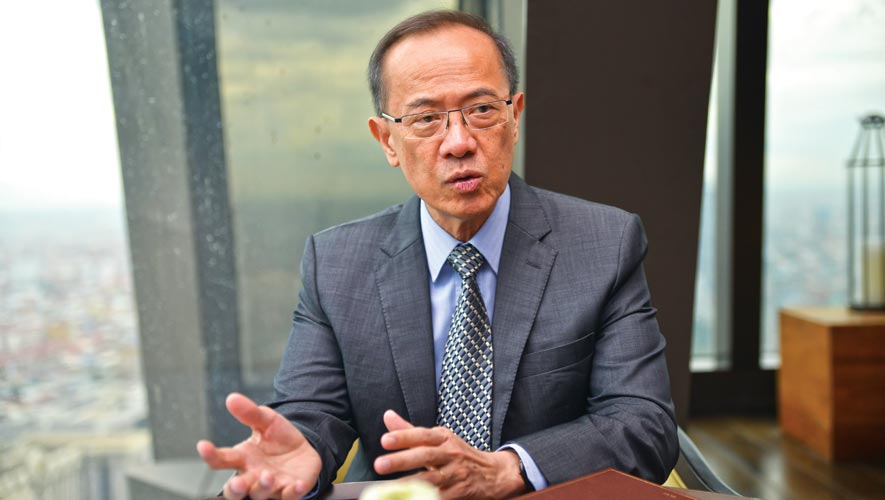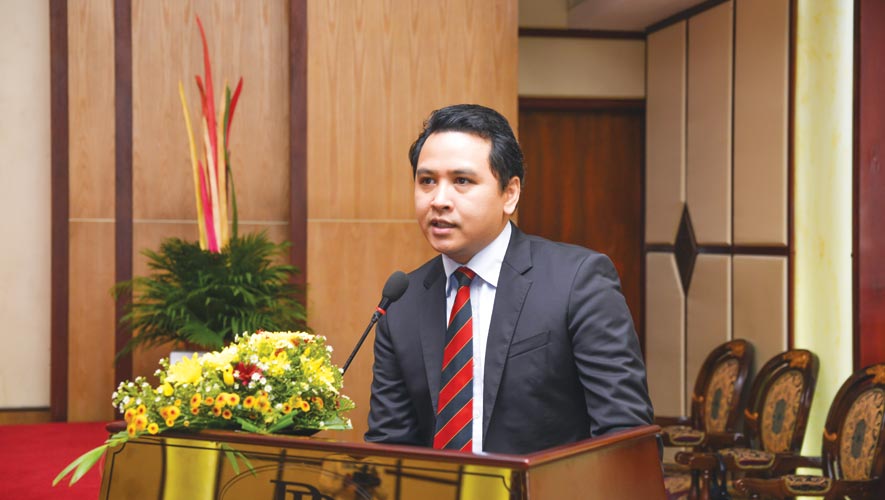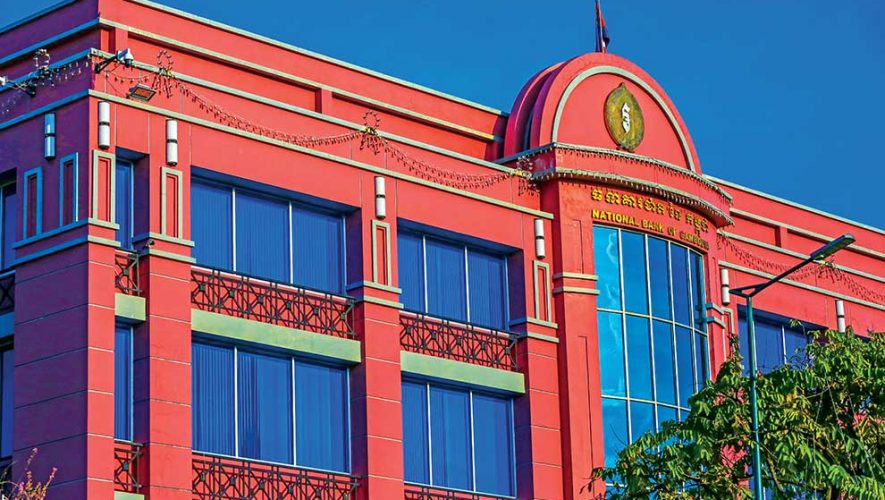Cambodia is at the right juncture to seize opportunities amid a bright future ahead due to a strange combination of external circumstances
For the latest Cambodian Business news, visit Khmer Times Business
In the second part of the interview with George Yeo, senior advisor to Kuok (Singapore) Ltd (Kuok Group) and its Hong Kong-listed Kerry Logistics Network Ltd, he talks about plans for Kerry Logistics, Cambodia’s trade risks and potential, as well as his professional transition from being in the military to politics and business. He is joined by Worldbridge Group chairman Rithy Sear
What are the plans for Kerry Logistics in relation to the logistics hub?
Yeo: We have a big centre located on a 53 hectare land, not far from Phnom Penh. Currently, we are only using 25 hectares of land, which is bonded. But we see a lot of growth prospects. Our Kerry Express (Thailand) Ltd service, dominant in Thailand is now making great progress in Cambodia. These are all activities done in partnership with Worldbridge. We are lucky to have them as our partner.
Separately, we have always had a freight operation here. Even in freight operation, we hope to work closely with Worldbridge, and specifically for domains like cold chain in Cambodia which is not very well developed.
If it involves good restaurants, it is okay but it depends in provinces. There is room for improvement. For food, it does not matter so much unless you are having sashimi, otherwise you can cook it. But the issue is when it comes to pharmaceuticals and vaccines, some of the service is substandard and potentially problematic. This is in terms of vaccine transportation in foam boxes. It may not have mattered in the past but this is an issue of life and death. So, it is important now. The market is still small, seeing that it is at early stage. but we see growth potential.
Sear (picture, right): Third party logistics is also very important. I visited Kerry Logistics in Hong Kong which services Belgian chocolatier Godiva. Kerry brings in big bars of chocolate and repackages it. This is processing, and they do it in a warehouse on the 17th floor. The container is lifted to the 17th floor, where the chocolate is carved and repackaged. It costs more to import ready-cut chocolates and distribute to neighbouring countries. (I believe) we can do third party logistics in Cambodia because labour is cheap.
Yeo: The chocolates (Godiva) come from Belgium at minus 20 degrees. At minus 20 degrees, chocolate has no life, so you can keep it like cheese for as long as you want. Then, they are defrosted over three days till about 16 or 17 degrees. Then, you have to visually check every one to make sure the structure is not broken as many are handmade. The packaging material comes from China and packed for seasons like Valentine’s Day. On the whole, if you visit the warehouse, it’s like a laboratory because everybody is in clean suits, the temperature is controlled, workers wear face masks and go through a sterilisation process. These are clean room conditions. The new warehouses are like that, it’s like semi manufacturing. We also have Canon as a major customer. They make camera bodies in China, with some key components coming from Japan and assembled in Hong Kong.
But every country has different terms, different warranty arrangements. So instead of having inventories in different countries, the inventory is in Hong Kong, and distributed according to demand to various markets in Southeast Asia.
Come to think of it, Cambodia can do a lot of this because it has land and cheap labour. But it needs a system to be in place. We cannot bring in goods and then say tariffs will be in place. It gets too complicated.
Sear: Kerry Logistics also has a “meat cutting” centre (as part of its cold chain activity). I import a lot of meat but it is ready cut meat. As it is, supplying meat to restaurants here is expensive. I think a meat cutting centre should be set up here but Cambodia doesn’t allow that. They should simplify the rules and regulations.
Yeo: There should be designated zones in Cambodia, like in Hong Kong where goods can go in and out without paying taxes.
Sear: Cambodia can diversify from garment and shoes. If, in future there is a problem, this will help us diversify from current jobs.
Yeo: With the US-Sino trade war, many companies, Chinese and non-Chinese, want to leave China, and China doesn’t mind because it wants to upgrade. It wants to move towards the services economy. The trade war is accelerating a process which was already underway. All these things need logistics. It can’t happen without it. We hope that as the Cambodian government builds up its ambitions while devising policies to give effect to its ambitions, we will have more to do here. I am feeling optimistic as I have seen progress over the years.
The laws have to evolve to facilitate new ambitions. If Cambodia continues to rely on apparel and shoes, it is not making progress because apparel and shoes can only give Cambodian workers a certain quality of life. And, you are constantly competing with others who are cheaper than you. You don’t want to be in that game. It should move out quickly when the wind is blowing and move to higher value-added activity.
How flexible is the Cambodian government to ideas? Is it receptive?
Yeo: Once they are convinced, they move very fast. I remember some years ago, Singapore’s second Prime Minister Goh Chok Tong suggested to Prime Minister Hun Sen that Siem Reap should open its sky. At that time, the Prime Minister was frustrated with the national airlines, and he thought it was a good idea, and he did it, and within a few years, tourism traffic to Siem Reap exploded, and there was no looking back.
There is a certain spirit of entrepreneurship among the government ministers. If it is a good idea and the prime minister is convinced, they move. He is critical. He raised the country to where it is today. He is a decisive man.
e-Commerce giant Ali Baba Group Holding Ltd also wants to start a logistics hub here. Would Kerry Logistics work with them?
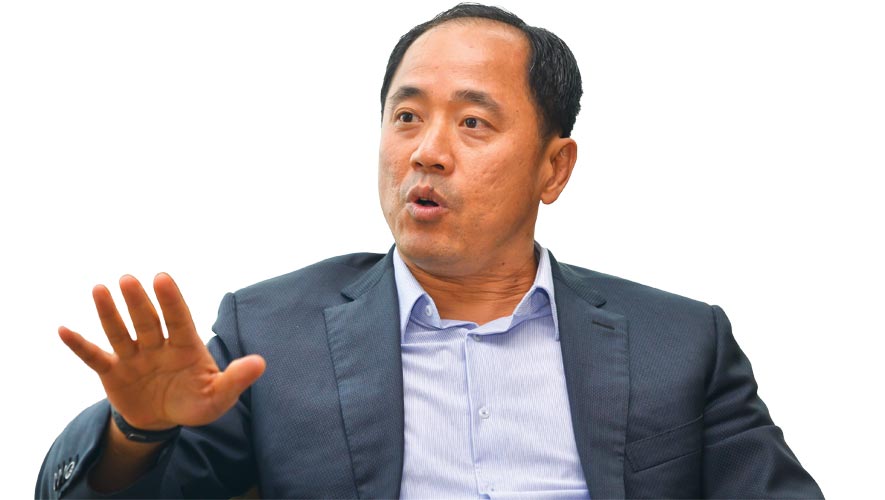
Yeo: We would very much like to work with them because they are a major player. They can provide anchor loading. We can add a lot of value to that operation too but it requires a supportive regulatory framework from the government. They should facilitate it and help turn Cambodia into a major logistics hub for the region.
We are working with the government to set up the framework. That is one reason I am here. It is one thing to say logistics in Cambodia and another thing to say Cambodia is a logistics hub for the region. It should be its next ambition.
You have had an illustrious career. Talk us through it, and your interest in Cambodia?
Yeo: When I was in the armed forces, the war in Indochina was still raging and naturally, we were always worried it would eventually spread to the Malay peninsula. As senior officers, we had to think through different contingencies. When Vietnam was re-unified in 1975, there was this terrible transition in Cambodia. It was Year Zero. The shockwave reverberated throughout Southeast Asia.
In 1989, the war ended and I remember Communist Party of Vietnam general secretary Nguyen Van Linh being hosted to dinner by (Singapore’s first PM) Lee Kuan Yew at the President’s office The Istana. At the end of the dinner, Van Linh asked Lee to be an advisor to Vietnam. Lee could barely believe what he heard because for 10 years, Singapore was battling Vietnam at the United Nations, and Non-Aligned Movement over Cambodia.
Lee didn’t formally accept the request but said he would visit Vietnam every two years. For the first three visits, I accompanied Lee (1991, 1993 and 1995). It was heartening to see how Vietnam was dedicating itself now to economic development. The initial years were difficult.
As a Trade Minister, I co-chaired an annual meeting with Vietnam’s Planning and Investment Ministry. They had mismanaged the economy and inflation had become chronic. Every time they loosen the economy, inflation became too high. When they tighten the financial system, the economy would slow down. Vietnam has finally taken off, partly because of China, which has become too expensive (to operate in).
I must say in my years in the military and into the government, I consider my own life to be part of a much larger landscape which is the end of war in Asia and its emergence in global economy and re-emergence of China in a global stage. That big cosmic event has affected all our lives. We are all part of that cosmic phenomenon.
I have seen my own life as a student going to University of Cambridge on a scholarship when “white men dominated the world”. I recall an incident when I was doing an industrial training at the British officers’ mess near Oxford. A British major sitting across us, hearing four Singapore officers speak in Singlish (Singapore English) on English, remarked “a well-colonised people”. It was so insulting. I never forgot that. I was barely 20 years old.
I wasn’t the only one, all of us were determined to show that we could stand up on our own. So one by one in Asia, we stood up. And we have in Asia today, in the case of China, even frightened the US (which) lead to the action against Huawei. This is only one illustration of how the world has changed.
Growing up first in the army and then airforce, and then persuaded by Lee and Goh to enter politics at a young age, I had the privilege of helming different ministries, and in every one of these ministries working with Asean and promoting Asean’s evolution, and being connected to all Asean neighbours while being fascinated by the recovery of a history that was subdivided by colonialism – British, French, Dutch. Now we are discovering each other.
In fact, historically, we were never far apart because we were linked by sea, air and land, and that we share a lot culturally. One can live in Cambodia and say this is Southeast Asia. If you go to Myanmar, Bali or Jakarta, it is still Southeast Asia. The idea that Southeast Asia is divided by colonisers – I think that (idea) is gradually recovering.
Southeast Asia is not just us but also China and India, it is woven. We are being reconnected by this big historical transformation. I held several ministerial positions where we are always pursuing the same plot or agenda which was Singapore’s policy.
When I went to the other side, the connectivity which I was pushing for and helped developed was well exploited by Kerry Logistics, which ran a trucking service from China to Singapore. The routes we were promoting (turns out) Kerry logistics was a beneficiary of. This time, I was seeing things from a different perspective.
When the trade war started, I was told by our young officer, there were enquiries to transport polymer resin from Cambodia to Myanmar to be spun and woven into fabric for export to Europe and the US. It was to be exported as Southeast Asian fabric and not as Chinese fabric.
Crossing into Thailand was not a problem but when our truck went to Mae Sai (Thai border town with Myanmar), customs officers asked what it was and if the (transport of) resin was covered by Asean. Custom officers at every gate are used to seeing certain things. In this case, if you transport new things, within the Asean Economic Community, which aims to facilitate the free flow of goods, would still prompt the officers to ask for the goods to be opened up. Therefore, as you open up, a more complex economic division of labour becomes possible.
I count myself fortunate to be living in this period of transformation. If we were living in the period of being colonised, we would have been miserable. At least now we are part of something grand, exciting amd full of possibilities while hoping to leave something our children will build on and benefit from.
Would the trade war benefit Cambodia?
Yeo: Yes, hugely. In fact, the moment it happened, many Chinese businessmen appeared at our special economic zone, asking us whether they can establish production facilities for simple things like hairdryers and lawnmowers. This involves bringing in parts and assembling, which gives rise to value addition. It can be sent off as Cambodian products to the US. The aspiration should be for more complex value-added services than just assembly.
Lately, US found issues with Cambodia, particularly relating to the Sihanoukville Special Economic Zone
Sear: That is not the case, you have to understand (the issue) carefully because it is happening to Vietnam and Cambodia as there are many ready(made) products. They are trying to get away with how to go to the US. Vietnam is doing some, albeit unofficially. In Cambodia, we rely on how China would find a way to export their products. We have to pay tax still, although it is lower, because we only export travelling goods to US under the generalised system of preferences (GSP). The rest are taxed.
Yeo: When the trade war started, business people started to react. Some cheated by re-labelling (which) is against the law. Others say they only do assembly and play with transfer pricing. But, the US customs would eventually catch up.
If we play it right and every time there is a shift, we enter a new niche. The important thing is to be alert, and be sprite, and look for an opening, to move into. In a few months’ time it may close, and there might be a new opening, then we shift.
In the meantime, policymakers should not be too sure of themselves. It is the responsibility of the business community to take risks and respond while policymakers facilitate the ability for them to respond.
What are the risks for Cambodia?
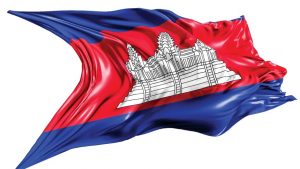
Yeo: By putting myself in your position here, I feel your policy should be broad. Agricultural processing must be more value-added within Cambodia which means more jobs for people. For instance, Cambodian rice sometimes “disappears” into Thailand and re-appears as Thai rice for various reasons. That is not good for Cambodia because Cambodian rice has its own reputation, and there could be downstream product that are proudly Cambodian.
For instance, Kampot pepper, which is a premium product. However, it needs to be packaged and distributed as a premium product. Then, promote manufacturing beyond textile and shoes, maybe electronics and mechanical stuff. But, don’t target specific domains in electronics, like mobile phones. Which is why I don’t think it is the job of the government (to decide policies). It should be left to businessmen who will make their own calculations. Some will win and some will lose.
With the impending loss of Everything but Arms and GSP, should there be more free trade agreements?
Yeo: Cambodia is unfairly picked on by the west, partly because it’s small and can’t bite back but the prime minister is feisty and stands up for what he thinks is right, and not buckle and smile. He will argue back. They (European Union and the US) wouldn’t do that to Vietnam, Indonesia or other bigger countries. I think it is the size of the domestic market.
The thing is, people need to understand Cambodia. When they come here and know its history, from 1974 to 1989 to 1990 and to today. Look at the country and the people. Look at the young. What is there not to be proud of? Hun Sen might not be perfect but his role has been dispensable.
Look at Etopia today, when Prime Minister Abiy Ahmed Ali took over from Hailemariam Desalegn Boshe, people said everything was wonderful, and then the army chief was shot dead. There is open rebellion (now).
Governance is not easy. When you have such a tortured history, you have to be careful how you open up. Cambodia has to explain this. You cannot expect people who, prior to dealing with you, know your history. You have to tell them.
There has to be much greater effort at communication. I think that if people understand, they would not be harsh with their judgement. You can always find fault in any country because for many people, it is just pure ignorance.
They come to Cambodia for the first time and criticise but they do not know what the country went through. Anyone who has been in this country for a period of time will appreciate what it has achieved. I have a different view and every opportunity I get, I tell people that Cambodia might not get 100 marks but I look at the country from a different perspective.


